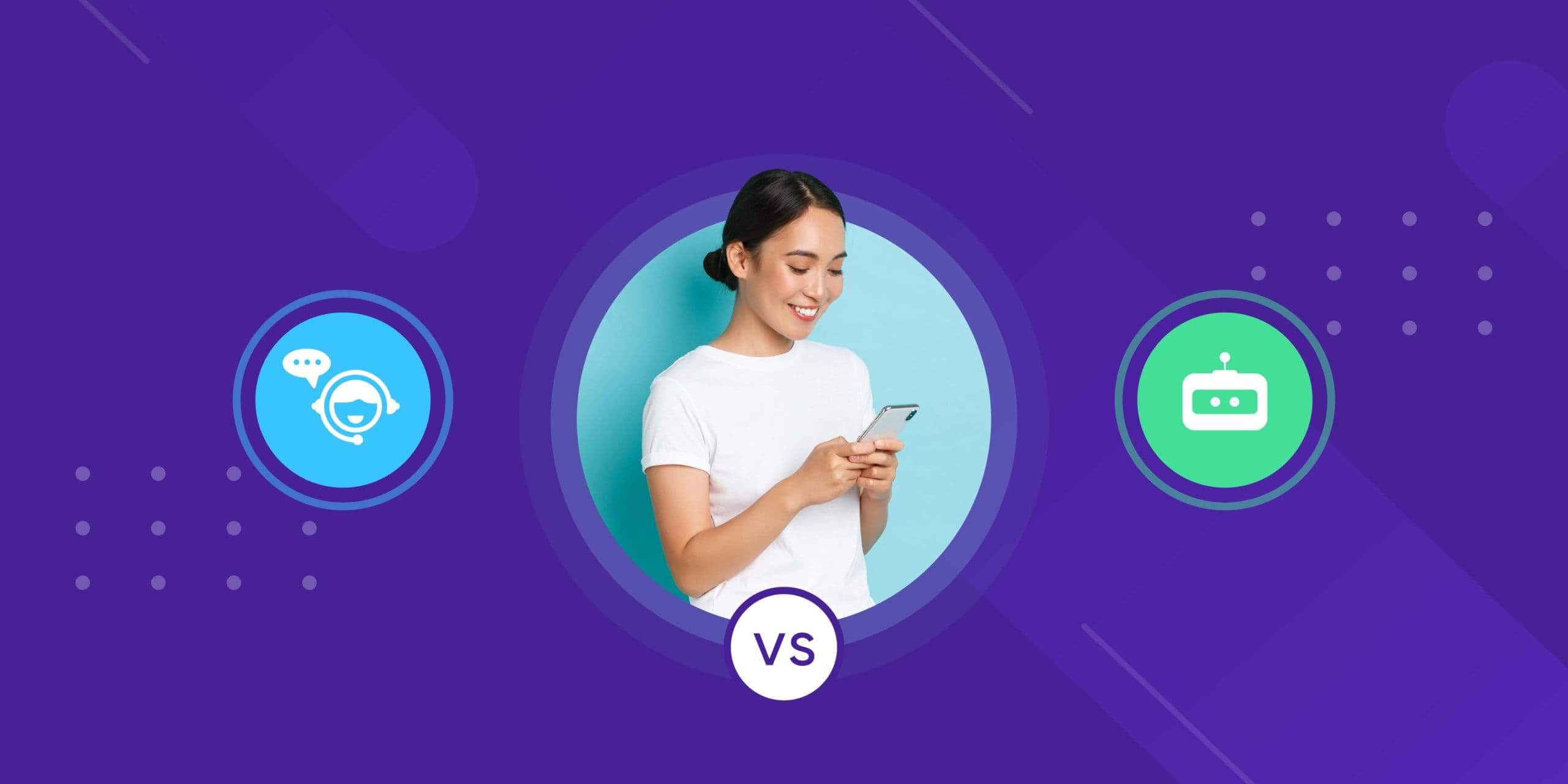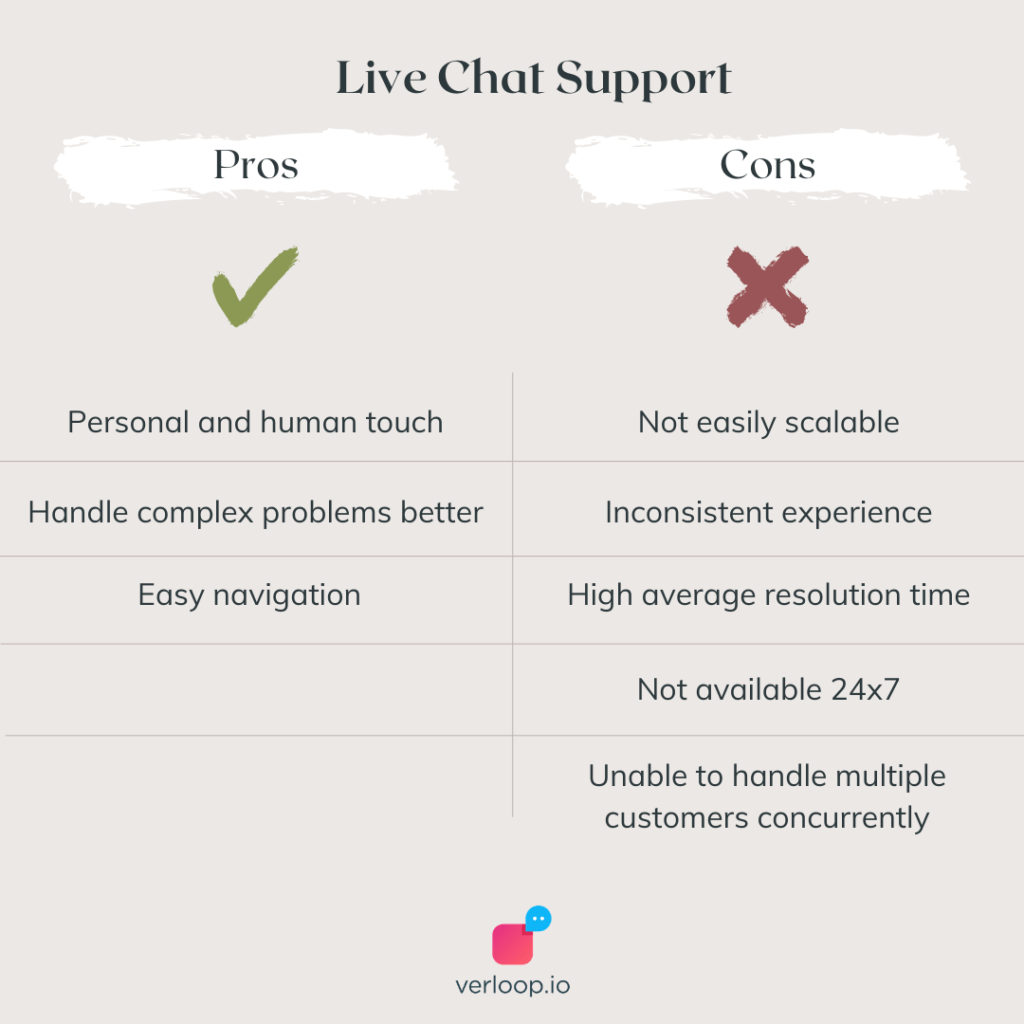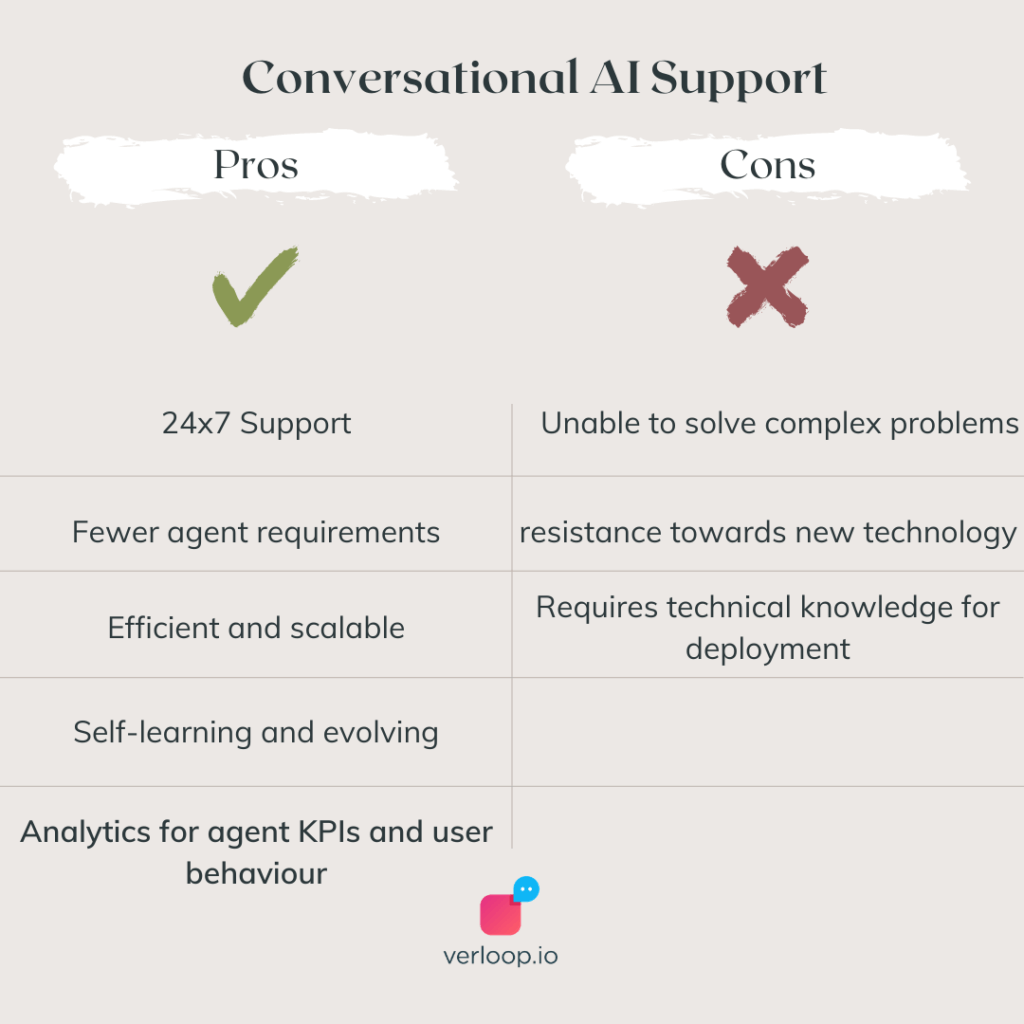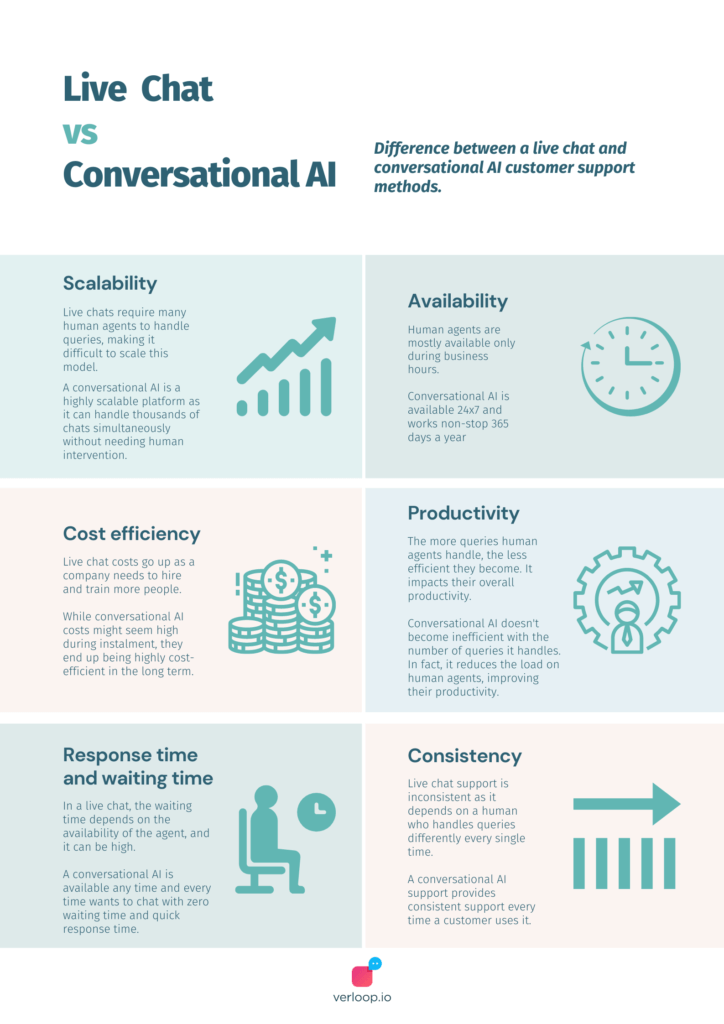Types of Customer Support: Live Chat vs Conversational AI
- April 7th, 2025 / 7 Mins read
- Harshitha Raja

Types of Customer Support: Live Chat vs Conversational AI
- April 7th, 2025 / 7 Mins read
- Harshitha Raja
When it comes to conversational AI vs live chat with human as a customer support option, the future seems to support the former. Let’s understand why.
Customer support services is an evolving field. The new generation is now turning into consumers, and they have a different set of preferences than the last one. The debate on which is better in conversational AI vs live chat comes up frequently.
Millennials prefer a text conversation to a phone call to get their queries resolved. But chat support also comes with its own set of challenges and opportunities.
Suggested Reading: Phone vs Conversational AI Support
While both offer to resolve user queries in real-time, there is quite a difference in their capabilities with their respective strengths and weaknesses.
Suggested Reading: Email vs Conversational AI Support
What is live chat support?
Live chat support is a type of chatbot support that connects the user to a human agent and have a real-time chat to solve support related queries.
Live chat support can aid customers with their doubts plus help them navigate any of the website functionalities.
Pros of live chat support
1. Personal touch
As there is a human sitting behind the scenes helping you out, you can feel that connection instantly. According to a Business Insider Report, 60% of the consumers believe that a human can understand their problems better than a chatbot.
2. Can handle complex problems better
Humans can understand the intricacies of worldly issues much better than a machine. They can use their personal experiences to help solve customer’s problems. Problems with serious technical difficulty can also be handled more efficiently by a human expert.
3. Not very technologically demanding
Live chat is easy to navigate as the human agent behind the chat can help the user. This makes the experience seem simple, leaving the customer satisfied.

Cons of live chat support
1. Not easily scalable
To scale this solution up, you will need to increase the number of human agents handling your queries along with space and equipment. Thus, proper planning and budgeting are required before any scaling up is possible.
2. Inconsistent experience
A customer’s experience depends on the individual handling your query. And every agent handles the situation differently. And this difference in experience also extends to the same agent, depending on their mood, the query type, etc.
3. High average resolution time
A live chat is like the text version of a call centre. First, it might take you some time to connect to a human agent. Second, even after you are connected, the agent might put you on hold to find relevant information or transfer you to another department. This increases the time it takes to resolve customer queries.
4. Availability
Human agents usually handle queries during business hours. So if your customers use a live chat service during non-business hours, they might not be able to chat with a human agent. Most likely, their queries will be registered as a ticket, and when an agent comes live, it will be assigned to them.
5. Unable to handle multiple customers concurrently
Live chat support, unlike conversational AI, can handle a limited number of users at a time. It depends on the human agent’s ability — how many chats can they handle at a given time. And even if they can handle multiple chats, they tend to slow down in responding to the query and increase the chance of error.
What is conversational AI support?
Many businesses have been providing live chat support options for years now. But the recent conversational AI vs live chat debate came to focus with advancement in AI capabilities of the chatbots.
Conversational AI is an artificially intelligent platform that businesses deploy on their websites or as their messaging representatives to solve customer queries.
Conversational AI is a human-made intelligence that is capable of conversing in human language. It includes understanding, processing, and generating natural language with the help of ML and NLU algorithms.
This enables AI-enabled chatbots to not only converse in human language but to take corresponding logical actions as well. This might include cancelling an order, subscribing to a service, booking a flight, or anything of that sort.
Suggested Reading: Conversational AI Security
Pros of conversational AI
1. 24×7 Support
Machines don’t tire out due to exhaustion. This gives them the ability to serve customers whenever they need it. Businesses operating in multiple time zones benefit from this service especially. With changing lifestyles, people in similar time zones also end up using such services round the clock. Plus, more than half of the customers expect a business to be available 24×7.
2. Fewer agent requirements
A conversational AI chatbot doesn’t need many agents to operate, as in the case of live chats. They even make business operations more cost-friendly. According to an IBM report, chatbots can help businesses save up to 30% on their customer support costs.
3. Scalability
A conversational AI can very easily handle changing demand scenarios. One can throw as much they want on an AI agent. It will be able to answer all customer queries simultaneously and non stop.
4. Higher efficiency
Machines have a faster response rate than humans. Also, they can handle all visitors at once. Thus, everyone gets served as soon as they raise a query. There is no waiting time and hence better customer experience. Also, they reduce the workload on their human counterparts. Companies using chatbots have reported 51% less chat traffic to human agents.
5. Personalised experience
Conversational AI is built around centralised data and integrates with your companies CRM and other software tools. Using this information, they can personalise the query resolution process by associating the user’s profile data with the ongoing conversation. This provides a much smoother query resolution.

Cons of conversational AI
1. Complex problems
Even with its higher intelligence, a conversational AI might struggle at understanding and solving a complex customer problem. The main aim of conversational AI is to use automation smartly to resolve frequently asked questions and resolve them quickly and accurately. It also depends on how well the AI is trained on the number of queries and type of intents.
2. Highly Trained Staff
Organizations often need a highly trained staff to develop and deploy a conversational AI solution for their specific business needs. Or they might go through a third-party solution provider but selecting one might be a difficult task.
Difference between live chat and conversational AI
1. Scalability
Live chats require many human agents to handle tasks. This makes this model unscalable, as it also increases costs. This affects the customer satisfaction score and experience.
A conversational AI is a highly scalable platform as it can handle thousands of chats simultaneously. In addition to this, conversational AI support can be proactive, reducing the load on support teams even further.
2. Availability
In a live chat, human agents are available only during working hours. For people seeking support off these hours or in different geographical regions, find it difficult to resolve their queries efficiently.
On the other hand, a conversational AI is available 24×7 and works non-stop 365 days a year. Plus, they can converse with people with different language requirements because of their multilingual ability.
Suggested Reading: Chatbots vs Conversational AI
3. Cost efficiency
Live chat costs go up as a company needs to hire and train more people. And to support the human agents, a company needs to bear many overhead costs.
While conversational AI costs might seem high during instalment, they end up being highly cost-efficient in the long term. The platform is self-learning, so it doesn’t need training as well.
4. Productivity
There is always a limit to how many queries a human agent can handle concurrently. The more queries they handle, the less efficient they become. It impacts their overall productivity as they end up resolving similar and monotonous queries. It leads to work fatigue and reduces employee satisfaction.
There is no such limit for a conversational AI. If things get a lot busier, the only thing you might have to do is change your plan (if it’s based on the number of conversations). Because of this, the agents have a lesser load and more time to take on complex tasks and give their attention to issues that require more attention.
5. Response time and waiting time
As mentioned earlier, the response time and waiting time can differ in a live chat. It depends on the agent’s availability and how quickly they can type.
A conversational AI is an AI agent that’s available any time and every time a customer needs support. They are quick to greet and engage with customers as soon as they start a conversation. And when it comes to customer support, they can quickly resolve queries for FAQs without any human involvement.
6. Consistency
A good customer experience is when all customers are treated equally. For this, providing consistent support becomes important. Live chat support is inconsistent as it depends on a human who handles queries differently every single time.
A conversational AI support provides consistent support every time a customer uses it. This provides superior customer service as customers know what to expect.

The winner in live chat vs conversational AI
When it comes to conversational AI chatbot vs live chat with human as a customer service option, the future seems to support the former. However, it would be wrong to assume that human-backed live chat support is going out of the window any time soon.
While simple repetitive queries have definitely become the forte of the conversational AI chatbots, we will still require human support in live chats for handling many complex queries requiring subject expertise.
A conversational AI support system integrates live chat support in it. If it cannot resolve the query on its own, it transfers the chat to a human agent.
Verloop.io is a leading conversational AI platform that helps companies deliver delightful experiences to their customers. We have trained the AI to under multiple intents and on different industry’s use cases. Our conversational AI platform also allows customers to communicate using voice messages.
If this sounds interesting, let’s talk. We can implement a conversational AI platform on your website, mobile, WhatsApp or Facebook pages.
FAQs
1. What is the difference between Live Chat and Conversational AI?
Live chat connects users to human agents for real-time support. Conversational AI, powered by AI agents, automates customer conversations with natural language understanding. Unlike live chat, AI agents offer 24/7 availability, faster resolution, and consistent responses at scale.
2. Can AI agents completely replace human support teams?
AI agents can automate a large portion of customer queries—especially repetitive or transactional ones. However, for complex or high-emotion scenarios, human agents still play a critical role. Most businesses today use a hybrid model where AI agents handle the bulk of queries and escalate to humans when needed.
3. Are AI agents more cost-effective than live chat support?
Yes. While initial setup costs exist, AI agents significantly reduce operational costs over time. They lower the need for hiring, training, and scaling human support teams—making them a highly cost-efficient option for growing businesses.
4. Can AI agents provide support in multiple languages?
Absolutely. Modern AI agents, like those built on Verloop.io’s Multilingual Conversational AI platform, support over 80+ languages and dialects. This allows businesses to deliver consistent, localised customer experiences globally.
5. Which is better for scaling support: Live Chat or AI agents?
AI agents are far superior when it comes to scalability. Unlike live chat, which depends on human availability, AI agents can handle thousands of conversations simultaneously—without compromising response time or service quality.







